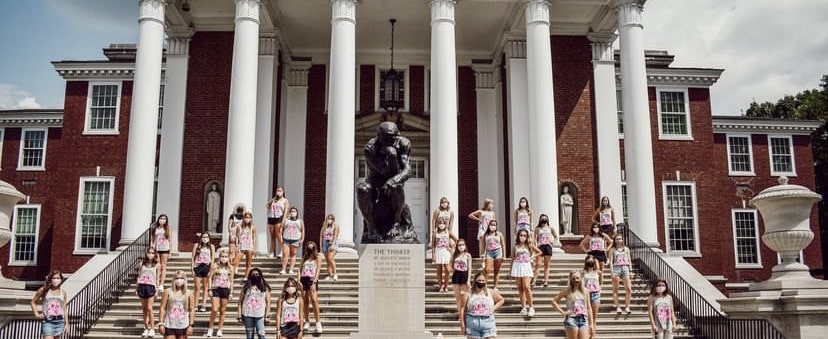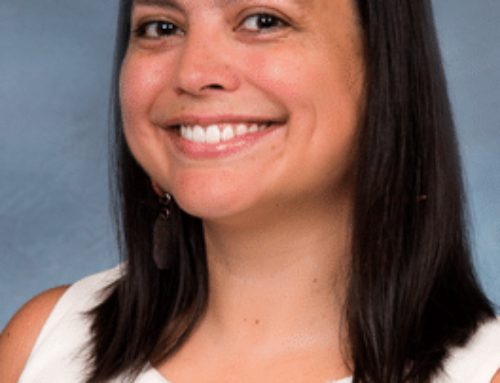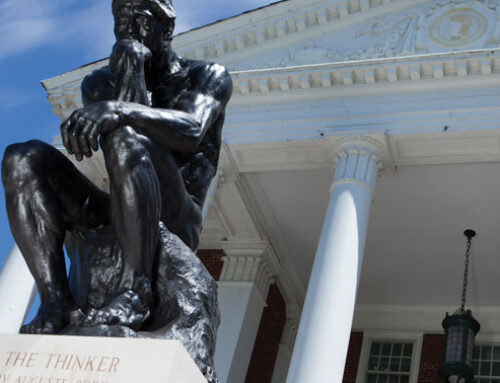By Payton Carns
COVID-19 restrictions meant the 2020-21 school year began in isolation.
In August 2020, almost 3,500 freshmen began at the University of Louisville. Typically, this would mean a bustling campus full of fresh faces mapping the routes to their class buildings.
The reality: the move-in day turned into a move-in week, with students entering the dorms over the course of three days in staggered groups. Each student completed a 14-day quarantine, an isolating way to end a secluded summer. Recruitment for Greek life organizations was entirely virtual and no one had any idea what sports events would even look like.
Masks in tow, students entered U of L with the uncertainty of a global pandemic weighing on top of the typical uncertainty of being a freshman in college.
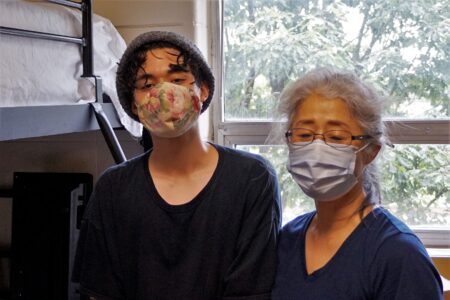
Class of 2024 member Will Doty moves into his freshman dorm in 2020. Photo by Anthony Riley, The Louisville Cardinal.
The 2020-2021 school year had its ups and downs. While a few professors opted to still teach in-person courses, most students began their academic journey at U of L in front of their laptops.
Vaccinations were not made available until the beginning of the 2021 calendar year, so students and professors were vulnerable to the virus.
As COVID-19 cases dropped and rose again, students had no idea when this would end, or if it ever would.

David A. Johnson, Ph.D., M.P.H., C.P.H., teaches a public health course in a socially distanced classroom at UofL in 2020. Photo by Madelin Shelton, The Louisville Cardinal.
Three years later these anxious freshmen have grown into seniors, taking on the last nine months of their college experience. Although COVID-19 is still around, vaccinations and a much better sense of how COVID-19 works allowed the university to do away with many distance guidelines.
It wouldn’t be right to say things have gone back to normal. People will feel the physical, mental, and emotional effects of the pandemic for the rest of their lives. However, U of L seniors understand both the current college experience and the one they entered into in 2020. The class of 2024 has had a more complicated college journey than most — how do they look back on that time period now?
Two Students, One Journey
On the surface, class of 2024 students Olivia Hanke and Merissah Russell do not have much in common.
Hanke is a Louisville native with hometown ties that drove her decision to attend U of L. An honors student planning to go through sorority recruitment, she was excited to begin a new chapter after her old one was cut short.
Russell stepped off a plane from Canada earlier that summer to be in town for summer training. She was the women’s basketball team’s newest guard. In a new country without her family for the first time, she struggled to adjust properly.
“I got dropped off at the airport by my parents, then I didn’t see them for the next year,” Russell said. “It was insane.”
Even though Hanke and Russell came from two different circumstances going down two different college paths, the abrupt end to their senior year — and the uncertain beginning of their freshman year — connects them and the rest of the class of 2024 together.
Both women also shared more than a few after-effects of this time period.
Academic Difficulties
A student’s undergraduate studies shape the career path they intend to pursue. Major programs are intentionally designed to provide each student with a well-rounded education in the field of their choice. These programs falter, however, when many professors have to adapt their curriculum to the digital format.
Even though online schooling existed before the pandemic, classes that thrived on peer engagement were confined to the screen. Online learning is a choice for many, but comprehension skills do not always translate.
Hanke, a Political Science and Spanish double major, felt the effects of a virtual school year heavily. Spanish, especially, was a struggle. It’s a major very reliant on professor and classmate communication.
“My Spanish got so much worse,” Hanke said.
Hanke came into college conversational in Spanish, and although she ended up bouncing back, faced a major setback academically. Fortunately, as things opened back up Hanke took hold of many opportunities to make up for lost time.
Most recently, she returned from a study abroad program over the summer in Madrid, Spain.
“I had wanted to travel abroad for so long, and then when COVID happened, it felt impossible,” she said. “But when we got back to in-person classes, I got to go to office hours with professors who have studied abroad, and that allowed me to pursue that opportunity.”
Russell had a similar reaction to these circumstances which were further amplified by her busy basketball schedule. Often, she wondered if she was getting anything out of her course load.
“I had a drama class online, which didn’t make any sense to me,” she said. “I had to just act in front of my phone.”
As she prepares to graduate this spring, Russell wonders if her academic career is well-rounded enough. As an exercise science major, things like learning the complex nature of muscles in the human body — a very important part of the degree – got pushed online when the typical learning method was through physical models in the classroom.
“I don’t know if I got a fair shot at a college education, I must admit,” she said.
Even so, Russell can look back at that time knowing that although it was not an ideal circumstance, the bitterness has faded into valuable life experiences.
“You persevere and you gotta do what you gotta do,” she said.
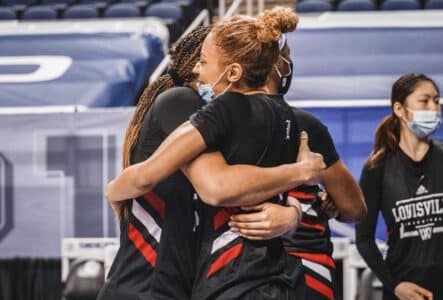
Russell embraces with her teammates during a 2020-21 season basketball game. Photo provided by Merissah Russell.
Social Isolation and Mental Health
The biggest complaint from Russell and Hanke, not dissimilar to most young students, is the loss of a major period of social development. This impacted both women similarly but stemmed from different things.
Typically, the quintessential freshman experience is traveling in packs, whether that be friends from one’s dorm or familiar faces during welcome week. When those elements are pushed out of the equation, there is no natural way to meet new people.
For Hanke, this was detrimental to her social life. When she was not seeing people in person, it was easier to stay cooped up in her dorm. This, however, became quickly isolating and lonely. Even when she did make intentional choices to socialize, like participating in sorority recruitment, COVID-19 guidelines hindered that experience too.
At a certain point, it began to affect her mental health.
“You had to be very intentional about going out and meeting people,” Hanke said. “For me, when I was not doing well mentally already, it was hard to find the motivation to do so.”
In retrospect, though, Hanke says she developed more intentional social habits, learning not to take those opportunities for granted. This was especially evident when things began to look more “normal” the next academic year.
“I think the 2021 freshman class brought in a lot of hope and new social energy,” she said. “I felt like I was having the freshman experiences I never got.”
Russell felt a similar level of isolation, largely due to the tedious schedule of basketball season. With the fear of a COVID outbreak disrupting their season, she and the rest of the team had little social interaction outside of each other.
“We just went from home to the gym,” she said. “So we didn’t really have any outlets that regular students would have.”
The basketball season itself was very up and down. Limited crowds and travel opportunities put a damper on what it is like to be a D1 college athlete, and there was always the threat of an infection canceling a game or even the rest of the season.
Outside of the athletic losses, Russell was generally missing social interaction as a naturally extroverted person. Because of the isolation of their first year, she is still meeting fellow student-athletes in her grade for the first time as a junior or senior.
“Even still I’ll ask them ‘What year are you’ and find out they’re juniors or seniors,” she said.”I’d laugh and be like ‘Aye you’re a COVID freshman.'”
Even though she missed a lot that first year, as a senior, Russell wishes she could tell her freshman self to stay positive and stay the course.
“I had some times where I was like ‘I don’t even know what I’m doing right now,'” she said. “But if you’re dwelling in yourself you kind of go in this dark pit, so it’s all about leaning on the people around you.”
Russell emphasized the closeness that came from spending so much time with her teammates, even if it did stem from a scary time.
“I always say that we have a built-in 14-person friend group,” she said.
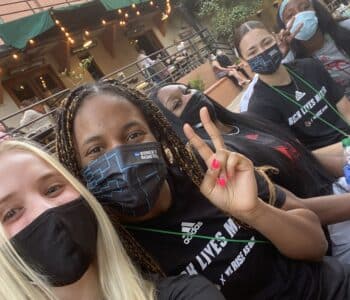
Russell and her fellow teammates out to eat during the 2021 NCAA Tournament. Photo provided by Merissah Russell.
Looking Ahead
Every student in the class of 2024 has their individual story about that harrowing freshman year; whether they’re an honors student grappling with leaving their dorm or a Canadian athlete finding their footing in a new country, entering a chapter of their lives as big as college in such a limited way defined their four years and U of L tremendously.
But as seniors in a somewhat back-to-normal university environment, there is a reflective sense of growth and development that came from the anxiety and confusion.
“I don’t know if everyone had so much growth between freshman and senior year,” Hanke said. “But I know I did.”

